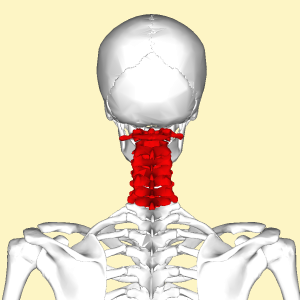Headache from Neck Problems? Still Tricky to Diagnose.
New research coming from France and Canada indicates that cervicogenic headache, headache coming from problems in the neck, is still not-so-easy to diagnose.

All of us would love to know if solving a neck problem would resolve our headaches. But this is tricky, because many types of headaches are related to neck pain. Migraine is often accompanied by neck pain, for example. That doesn’t mean that treating the neck will resolve the migraine symptoms.
But in the case of cervicogenic headache, there will be evidence that the headache is caused by problems in the neck.
The International Classification of Headache Disorders 3 describes it this way: Headache caused by a disorder of the cervical spine and its component bony, disc and/or soft tissue elements, usually but not invariably accompanied by neck pain.
Of course, your chances of diagnosing this type of headache if you have no neck pain are even slimmer.
A recent study published in August by Musculoskeletal Science and Practice (Cervicogenic headache, an easy diagnosis? A systematic review and meta-analysis of diagnostic studies) looked especially at a common method to diagnose cervicogenic headache, called the cervical flexion-rotation test. This test is done by a specialist who will test the rotation of the neck. (You can certainly notice problems on your own, but this test does need to be done by someone who is trained to notice small differences. More on the cervical flexion-rotation test.)
The researchers concluded that this test had “a small to moderate effect on the probability of a patient having” a cervicogenic headache, as opposed to another type of headache. In other words, it’s a good way to point at least a few patients in the right direction, but it’s not in any sense the final word.
There are other ways to diagnose, although this may be the key one. So in the end, your doctor will need to try a few things and draw on his or her experience, so that you can decide together whether further neck treatment will be of help.
A nerve block is another way to diagnose cervicogenic headache. If blocking nerve sensitivity in the neck stops headache symptoms, you’ve narrowed down the location of the problem.
Nerve blocks are also sometimes used as a treatment. But it’s important to realize that cervicogenic headache does not have one specific cause, although the general location of the cause will be the same. So treatments will vary quite a bit, depending on what the neck problem actually is, which can range from something simple to something quite serious.
Finding a specialist with experience in this type of headache will certainly help. If you suspect that your neck problems are causing or even triggering headache attacks, do mention it to your doctor.

26 October 2023 @ 6:52 pm
Anecdotal: my neurologist gave me nerve blocks for migraine that also relieved my neck and shoulder pain from arthritis that radiated down to my elbow. Why did I have to wait decades for this relief?